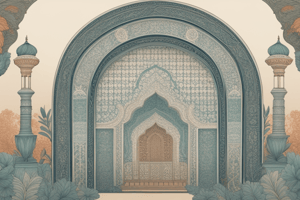Podcast
Questions and Answers
Who founded the Indian National Congress with the primary goal of promoting social reforms among Hindus and Muslims in India?
Who founded the Indian National Congress with the primary goal of promoting social reforms among Hindus and Muslims in India?
What was the primary goal of the Indian National Congress when it was founded?
What was the primary goal of the Indian National Congress when it was founded?
Which movement was launched in response to the Rowlatt Act of 1919?
Which movement was launched in response to the Rowlatt Act of 1919?
What incident led to Mahatma Gandhi calling off the Non-Cooperation Movement?
What incident led to Mahatma Gandhi calling off the Non-Cooperation Movement?
Signup and view all the answers
Which movement urged Indians not to cooperate with British authorities through demonstrations and boycotts?
Which movement urged Indians not to cooperate with British authorities through demonstrations and boycotts?
Signup and view all the answers
What event eventually led to the Partition of India?
What event eventually led to the Partition of India?
Signup and view all the answers
What was the main reason behind the initiation of the Quit India Movement in 1942?
What was the main reason behind the initiation of the Quit India Movement in 1942?
Signup and view all the answers
Which movement resulted in severe repression by the British authorities, leading to mass incarcerations?
Which movement resulted in severe repression by the British authorities, leading to mass incarcerations?
Signup and view all the answers
What was the primary goal of the Salt Satyagraha campaign launched by Mahatma Gandhi in 1930?
What was the primary goal of the Salt Satyagraha campaign launched by Mahatma Gandhi in 1930?
Signup and view all the answers
Which event led to the division of British India into India and Pakistan based on religious lines?
Which event led to the division of British India into India and Pakistan based on religious lines?
Signup and view all the answers
Which movement saw participants march to the sea to produce their own salt as a form of protest?
Which movement saw participants march to the sea to produce their own salt as a form of protest?
Signup and view all the answers
What significant impact did the Salt Satyagraha movement have on the British government in 1931?
What significant impact did the Salt Satyagraha movement have on the British government in 1931?
Signup and view all the answers
Study Notes
Overview of National Movement History
The national movement history of India encompasses various struggles and movements aimed at securing independence from British rule. This article provides a brief overview of key events and movements in this period, including the Indian National Congress, Non-Cooperation Movement, Quit India Movement, Salt Satyagraha, and the eventual Partition of India.
Indian National Congress (INC)
The Indian National Congress was an organization founded with the primary goal of promoting social reforms among Hindus and Muslims in India. It is also widely known for its role in the struggle against British colonialism during the 19th century. Initially focused on constitutional and moderate means, it eventually adopted more radical measures like noncooperation, civil disobedience, and nonviolent resistance.
Non-Cooperation Movement
The Non-Cooperation Movement was launched in response to the Rowlatt Act of 1919, which aimed to suppress violent protests against British rule in India. The movement, led by Mahatma Gandhi, urged Indians not to cooperate with the British authorities, leading to widespread demonstrations, boycotts, and strikes. It culminated in the infamous Chauri Chaura incident, where peaceful protestors reportedly turned violent, causing significant repercussions that led Gandhi to call off the movement.
Quit India Movement
The Quit India Movement was initiated by the Indian National Congress in response to the British government's reluctance to grant India independence upon the termination of World War II in 1942. The movement included widespread protests and acts of civil disobedience like strikes, demonstrations, and boycotts. It resulted in severe repression by the British authorities, leading to mass incarceration and the eventual postponement of further campaigns.
Salt Satyagraha
Salt Satyagraha was a campaign launched by Mahatma Gandhi in 1930 to challenge the salt tax imposed by the British government. Participants marched to the sea to produce their own salt as a symbolic act of defiance against the British monopoly on salt production. The movement garnered widespread public support and led to the government's withdrawal of the salt tax in 1931.
Partition of India
The Partition of India, which took effect on August 15, 1947, divided British India into two independent states: India and Pakistan. This division was based on religious lines, with Muslims in the majority western regions of the subcontinent forming the new Pakistan, while Hindus and other religious minorities dominated in the new India. The partition led to widespread violence and forced displacement, causing significant upheaval and suffering.
In conclusion, the national movement history of India is marked by various struggles and movements aimed at securing independence from British rule. The Indian National Congress, Non-Cooperation Movement, Quit India Movement, Salt Satyagraha, and the Partition of India are all significant events that played a crucial role in shaping India's modern history.
Studying That Suits You
Use AI to generate personalized quizzes and flashcards to suit your learning preferences.
Description
Test your knowledge on the key events and movements of the Indian national movement history, including the Indian National Congress, Non-Cooperation Movement, Quit India Movement, Salt Satyagraha, and the Partition of India. Explore the significant roles these events played in India's struggle for independence from British colonial rule.




